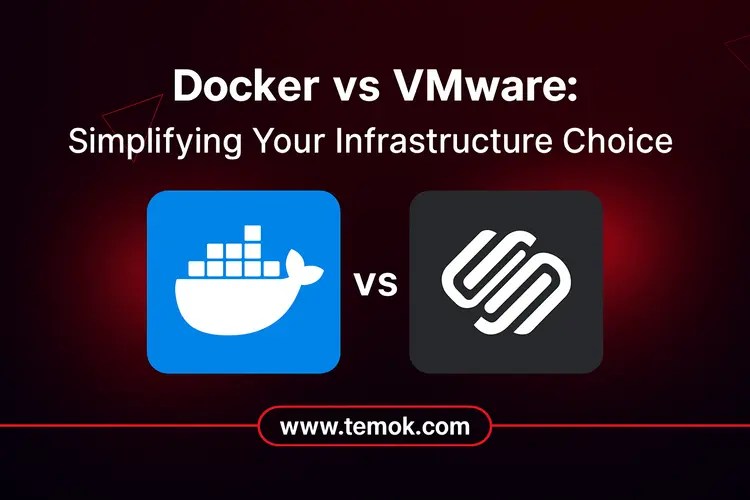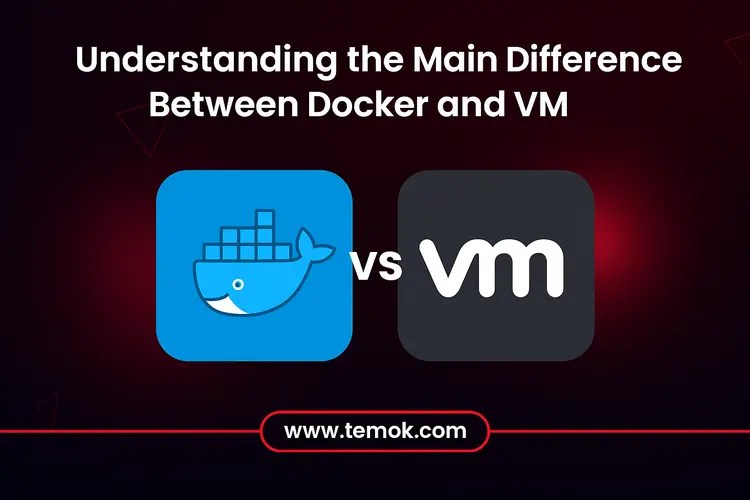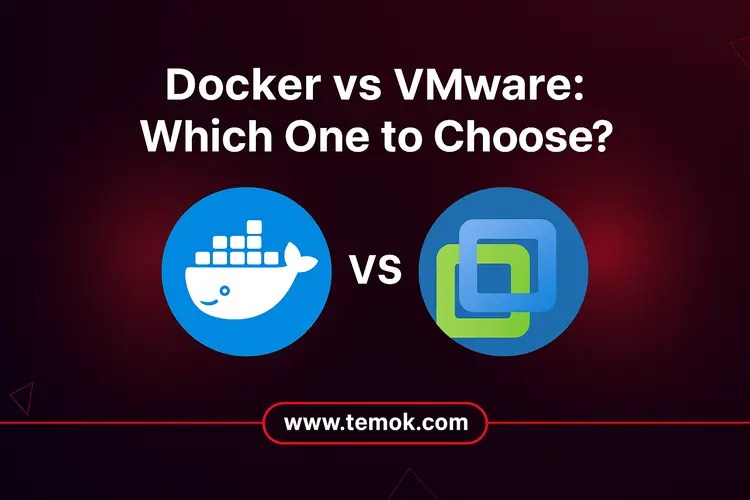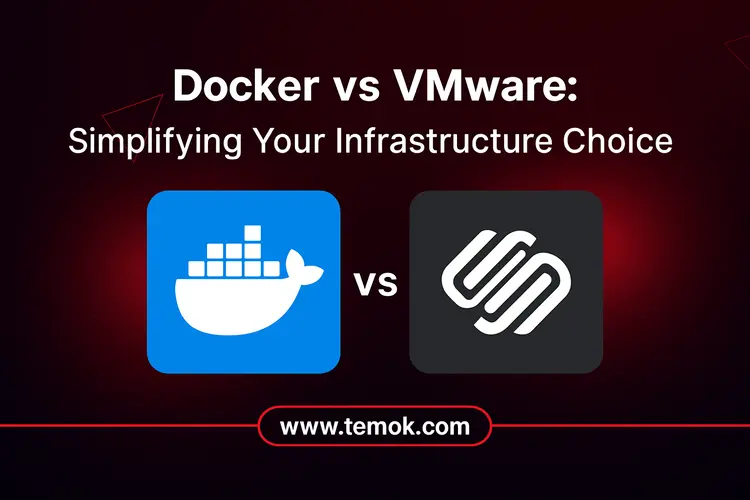This is a battle between Docker vs VMware: one is a virtual machine, the other is a containerization technology. Both VMware and Docker have unique characteristics and combinatorial advantages. In actuality, both containerisation vs virtualization technologies are complementary.
Indeed, there are certain parallels between Docker and VMware, but VMs are superior to Docker in other ways. Depending on your needs, you can choose between VMware and Docker.
Docker versus virtual machine both serve to duplicate the development environment and improve dependency and configuration management. However, there are several distinctions you must know that will help you decide whether to use a VM or a Docker container, according to the application.
Keep reading and exploring to learn the major difference between Docker and VM. We will also discuss what containers are in VMware.

Table of Contents
Docker vs VMware: Understanding The Concepts
Before jumping into the Docker vs VMware containers comparison, let’s discuss VMware and Docker one by one.
What is Docker and What Does it Do?
Docker is a software development tool & desktop virtualization technology. It allows you to effortlessly build, deploy, and manage programs utilizing containers. A container is a lightweight, standalone executable bundle of software that includes all of the libraries, configuration files, dependencies, and other components mandatory to run the program.
The primary objective of the Docker project is to employ containers to make it easier for developers to construct, deploy, and execute programs. Application portability and consistency are essential requirements for DevOps and CI/CD projects, and Docker does a good job of meeting these criteria. An application may be packaged with all the necessary libraries, dependencies, and resources for simple deployment thanks to containers in VMware, which are constructed from container images. Application deployment may be automated and expedited from development to production by building containers on top of the host OS, utilizing Linux kernel capabilities like name spacing and control groups.
In other words, programs execute the same way regardless of where they are or what computer they are running on, since the container offers an environment for the application throughout its software development life cycle. Because containers come in separate instances, they offer security, enabling numerous containers to operate concurrently on the same host. Furthermore, containers are lightweight because they do not require the additional burden of a hypervisor.
A hypervisor is a guest operating system, similar to VirtualBox or VMware, except that containers operate directly within the kernel of the host computer. Let’s discuss VMware now before jumping into the Docker vs VMware comparison.
What is VMware and What Does it do?
Virtual machines are perfect for testing other operating systems, such as beta releases, producing operating system backups, and running software and apps, since they can do jobs like running programs and applications like a separate computer. A host can operate many virtual machines simultaneously.
Since its products and solutions have led the way for an entire generation of virtualization technologies, this top-of-the-line vendor of virtualization software doesn’t require any introduction. ESX, vSphere Client, VMFS, vCenter Server, SDKs, and other tools and services are all part of VMware’s flagship virtualization package, vSphere. The suite serves as a kind of computer OS for cloud computing virtualization, providing a virtual platform for guest operating systems like Windows, Linux, and others.
Among the essential files that comprise a virtual machine are the log file, NVRAM setting file, virtual disk file, and configuration file. Server virtualization is another area where virtual machines (VMs) are quite helpful. By dividing a physical server into several separate, distinct servers, server virtualization enables each server to execute its own operating system. Virtual hardware, including CPUs, RAM, network ports, hard drives, and other components, is provided by each virtual computer. Now, let’s discuss the main Docker vs VMware differences.
Understanding the Main Difference Between Docker and VM

Understanding key Docker vs VMware containers differences is necessary in 2025. Here are the major points that differentiate Docker with VMware and vice versa.
OS Architecture and Support
The primary distinction between Docker vs VMware (VMs) is found in their architecture: every VMware virtual machine contains both the host and guest operating systems. Regardless of the host OS, a guest OS can be any OS, such as Linux or Windows.
On the other hand, Docker containers share a host operating system across a single physical server. Containers get lighter and take longer to boot up when they share the host operating system. While virtual machines are necessary if the apps or services must operate on various operating systems, Docker containers are thought to be appropriate for running numerous applications atop a single OS kernel.
Objective
The initial purpose of virtual machines was to enable the use of different operating systems on a single physical computer. Allowing users to construct a virtual world apart from the underlying hardware is the goal. To execute programs on various hardware designs and make better use of hardware resources, virtual machines (VMs) abstract hardware specifics.
In contrast to Docker vs VMware, Docker was created to offer a portable and lightweight method of packaging and executing programs in a repeatable and isolated setting. In order to overcome the difficulty of delivering programs across many environments, including creation, evaluation, and production, Docker abstracts operating systems information. Keeping the software environment consistent across all locations and managing updates may become quite difficult. This is particularly valid for companies that execute hundreds of apps or break them down into hundreds of microservices. Docker uses containerization to solve this issue.
Security
Virtual machines, together with their kernel and security measures, are independent, which is the second distinction between them and Docker. As a result, virtual machines are used by programs that require more security and privileges.
However, because Docker containers access the host kernel, it doesn’t make sense to grant root access to apps and execute them with administrative privileges. Because the container technology has access to the kernel subsystems, a malicious program can compromise the host system as a whole.
Use of Resources
Resource use is one of Docker’s benefits over virtual machines when comparing Docker vs VMware. Docker containers require fewer resources to operate than virtual machines (VMs) since they share the host system’s resources. Additionally, Docker containers use fewer resources than virtual machines (VMs) since they are far lighter.
However, VMware containers need additional resources to operate since they need to have a supervisor to operate. Therefore, in terms of resource use, VMware virtual machines a worse option than Docker.
Also Read: Kubernetes vs Docker: Navigating the Container Seas
Architecture
In addition to applications and their dependencies, such as libraries and other binary files, a virtual machine also runs a separate kernel and host operating system. The host computer or server and the virtual machine are coordinated by a hypervisor. It gives the virtual machine exclusive use of the physical hardware resources specified during instantiation. A single hypervisor can oversee several virtual machines on a single, potent server, each of which can run hundreds of apps.
Only its dependencies are present in a Docker container. Docker virtualization is powered by the Docker Engine. It facilitates communication between the underlying operating system, whether a virtual or real machine, and the containers that are currently running.
Mobility
Another important distinction between Docker vs VMware is portability. Because virtual machines (VMs) are separate from their operating systems, you cannot move them across platforms without experiencing incompatibilities. Docker containers must be taken into consideration at the development stage if an application is to be tested across many platforms. Also, check out Temok’s virtual private server services!
Because Docker container packages don’t require a guest operating system, they may execute programs in any environment and are easily portable across several platforms. Because Docker containers are lightweight and can start and stop much faster than virtual machines, you can easily deploy them on a server.
Replicability
The simplicity with which you can duplicate the isolated environments that Docker vs VMware offer will be the next consideration. From the size and speed we discussed previously, we may deduce the ease of replicability.
Using VMware can become wasteful and resource-intensive when several apps need to execute on separate VM instances. When you need to execute numerous apps, Docker containers are a better option since they are lightweight and efficient.
Also Read: Docker Commands Cheat Sheet: Mastering Your Ultimate Cheat Sheet
Performance
Performance is the final primary distinction between Docker vs VMware, because virtual machines must load the full operating system before they can begin operating, and they require more resources than Docker containers. Compared to virtual computers, Docker containers’ lightweight architecture uses fewer resources.
Resources like CPU, memory, and I/O aren’t always permanently assigned to containers in the case of a virtual machine. In contrast, in the case of a Docker container, resource utilization is contingent upon load or traffic.
Because a Docker container doesn’t require an OS installation, it is easier to scale up and duplicate than a virtual machine.
Cost
Lastly, while deciding between Docker vs VMware, price is another important consideration. Both are economical. However, because of their deployment procedures and resource efficiency, Docker is typically the best choice since it is less expensive.
The physical resources of the machine provide an additional cost advantage. In other words, Docker often uses fewer resources than a VM, which further lowers its expenses.
Although they are not as lucrative as Docker, virtual machines are nonetheless profitable. You could require a computer with greater resources because virtual machines tend to utilize more of the actual machine’s resources. This would again increase the cost.
Docker vs VMware: Which One to Choose?

Comparing Docker vs VMware is unfair because they serve distinct purposes. Although Docker is undoubtedly becoming more popular these days, you cannot consider replacing it by VMware virtual machines. Even if Docker is becoming more and more popular, there are some situations when VMware is a superior option.
Virtual machines operate on their operating system and pose no harm to the host computer. Moreover, they are a better option than Docker containers in a production setting. However, Docker is the best option if the applications need thorough testing. This is because it offers a variety of operating systems for comprehensive software or application testing. Dockers are undoubtedly better than VMware.
Additionally, unlike a virtual machine, a Docker container employs Docker Engine rather than a hypervisor. Using Docker Engine makes containers tiny, isolated, compatible, higher performance-intensive, and responsive because the host kernel is not shared. Because Docker containers may share a single kernel and application libraries, they have relatively little overhead.
Because the decision between Docker and VMware depends on the type of workload being supplied, organizations are primarily using the hybrid method.
Last but not least, Docker vs VMware are not in competition with virtual machines; rather, they are complementary solutions for certain workloads and applications. Virtual computers are developed for applications that are often static and do not change frequently. While the Docker platform has a flexible design, making container upgrades simple and frequent.
Conclusion
As we’ve seen, because of the complementary nature of Docker vs VMware, many businesses are asking, “How do we use Docker and VMware together?” rather than “Should we use Docker and VMware?”
Docker containers are worthy of your pick if having a quick and effective deployment is one of your needs. You can also scale and manage your apps with ease thanks to this. Choose Docker once more if a high level of security is one of your needs. Container isolation adds a degree of protection. On the other hand, virtual machines ought to represent a top choice for any firm that has to virtualize an entire operating system on a single hardware platform. Particularly if running numerous apps on the same computer is a necessity. However, Docker is better than VMware in 2025.
FAQs (Frequently Asked Questions)
Which Is Better, Docker Or VMware?
In comparison with VMware virtual machines, Docker containers often weigh less and start up more quickly.
Why Docker Instead Of VM?
Docker containers have some benefits over virtual machines (VMs). Moreover, chief among them are their portability and effective use of resources.
Does VMware Use Docker?
Yes, VMware uses Docker. Using Docker technology, VMware’s vSphere Integrated Containers (VIC) enables users to execute and administer containerized apps. It can be administered on top of conventional virtual machines on vSphere.
What Is The Difference Between Containers And VMware?
A virtual machine offers an abstracted representation of a real system’s whole hardware, including its CPU, memory, and storage. Containers are portable versions of software that operate on a real or virtual computer, together with all of their dependencies.
